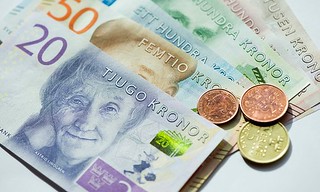
PREV ARTICLE
NEXT ARTICLE
FULL ISSUE
PREV FULL ISSUE
SWEDEN LEADS RACE TO CASHLESS SOCIETY
David Sundman forwarded this Guardian article about Sweden's rush toward becoming a fully cashless society. -Editor
Last year – as Britain did last week – Sweden launched a new series of notes, cheery affairs featuring 20th-century Swedish cultural giants such as Astrid Lindgren, the creator of Pippi Longstocking, Greta Garbo and filmmaker Ingmar Bergman. But like its Nordic neighbours Norway, Denmark and Finland, Sweden is fast becoming an almost entirely cashless society. “I don’t use cash any more, for anything,” said Louise Henriksson, 26, a teaching assistant. “You just don’t need it. Shops don’t want it; lots of banks don’t even have it. Even for a candy bar or a paper, you use a card or phone.” Swedish buses have not taken cash for years, it is impossible to buy a ticket on the Stockholm metro with cash, retailers are legally entitled to refuse coins and notes, and street vendors – and even churches – increasingly prefer card or phone payments. According to central bank the Riksbank, cash transactions made up barely 2% of the value of all payments made in Sweden last year – a figure some see dropping to 0.5% by 2020. In shops, cash is now used for barely 20% of transactions, half the number five years ago, and way below the global average of 75%. And astonishingly, about 900 of Sweden’s 1,600 bank branches no longer keep cash on hand or take cash deposits – and many, especially in rural areas, no longer have ATMs. Circulation of Swedish krona has fallen from around 106bn in 2009 to 80bn last year. “I think, in practice, Sweden will pretty much be a cashless society within about five years,” said Niklas Arvidsson, an associate professor specialising in payment systems innovation at Stockholm’s Royal Institute of Technology (KTH). Arvidsson argues that the country’s head start in the field began in the 1960s, when banks persuaded employers and workers to use digital bank transfers for wages as a matter of course, with credit and debit cards receiving a boost in the 1990s when Sweden’s banks started charging for cheques. Cards are now the main form of payment: according to Visa, Swedes use them more than three times as often as the average European, making an average of 207 payments per card in 2015. More recently, mobile phone apps have also taken off in spectacular fashion. Even Swedish churches have adapted, displaying their phone numbers at the end of each service and asking parishioners to use Swish to drop their contribution into the virtual Sunday collection. One Stockholm church said last year only 15% of its donations were in cash; the remainder were all by phone. There are, obviously, concerns: cases of electronic fraud have more than doubled in the past decade and several critics – including the inventor of iZettle, Jacob de Greer – have asked whether an entirely electronic system in which every single payment is recorded is not a threat to privacy. For these and other social reasons, Arvidsson said, cash is not dead quite yet. “Even if, in the next few years, Swedes use almost no cash at all, going 100% cashless needs a political decision,” he said.“The idea of cash, even in Sweden, remains very strong.” To read the complete article, see:

Wayne Homren, Editor The Numismatic Bibliomania Society is a non-profit organization promoting numismatic literature. See our web site at coinbooks.org. To submit items for publication in The E-Sylum, write to the Editor at this address: whomren@gmail.com To subscribe go to: https://my.binhost.com/lists/listinfo/esylum All Rights Reserved. NBS Home Page Contact the NBS webmaster 
|
